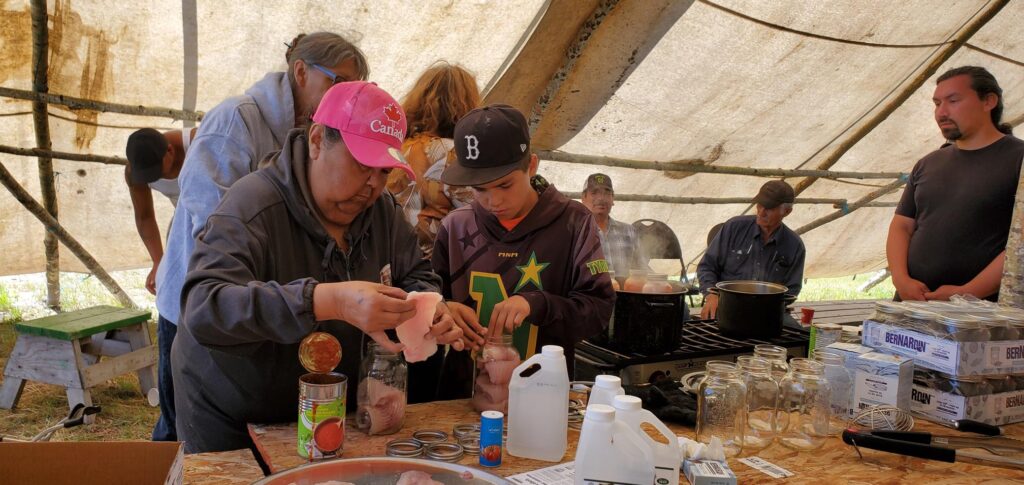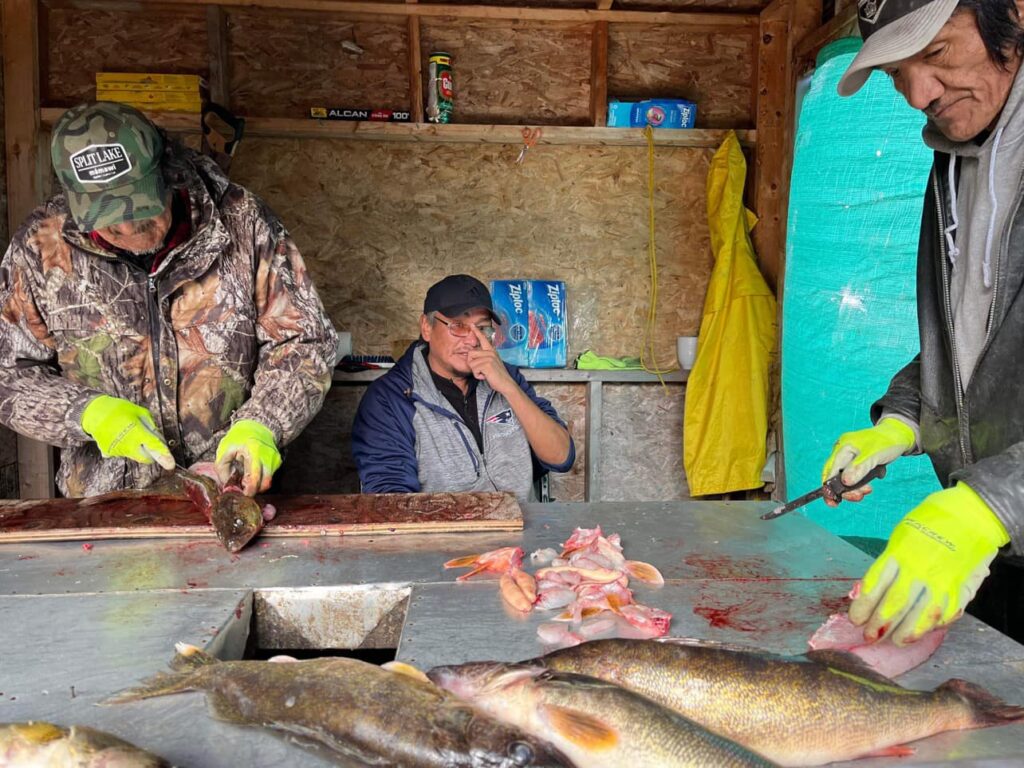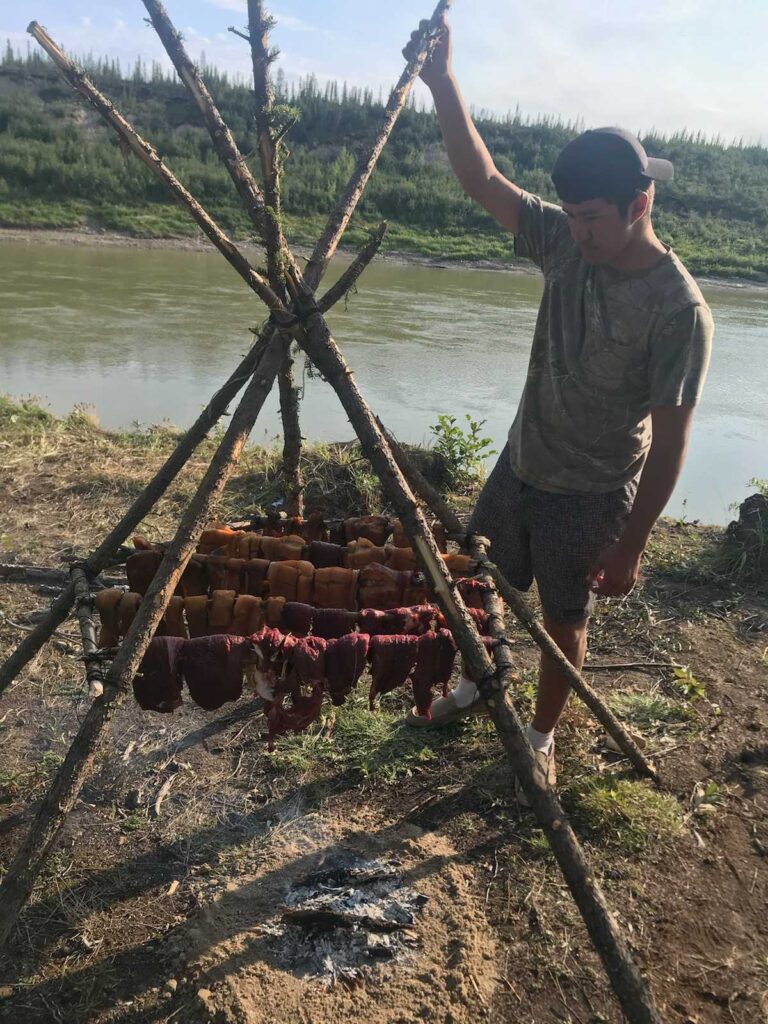Reconnecting to tradition creates a bright future for communities in Northern Manitoba

Stories about access to food in Northern communities, or lack thereof, crop up regularly in the news, often accompanied by a photo of a $12 head of wilted lettuce or $14 bottle of ketchup. The sticker shock, combined with recognition that these communities may lack infrastructure and economic opportunity, makes clear that a viable solution to food precarity in the North is desperately needed. Enter Food Matters MB, a Winnipeg-based organization working to create sustainable food systems in communities across Northern Manitoba.
Food Matters’ Executive Director, Demian Lawrenchuk, a member of Fox Lake Cree Nation, is focused on building capacity for Northern communities to help create and maintain self-sustaining food practices. He says, “the root of the problem is colonization,” which has created social isolation and a disconnect from traditional food gathering practices.
An experienced and enthusiastic gardener, Lawrenchuk observes that resources are often used to create gardens and greenhouses in as many communities as possible, a well-intentioned approach that can nevertheless mean “you aren’t doing the best to build up strong teams, you are chasing one-time interactions.” He explains that embarking on ambitious projects that require learning a whole new set of skills “is a tall order when a lot of people are dealing with the social impacts of colonization – people are emotionally beaten down and have lost hope. When there’s no hope, people can’t sustain initiatives.”
“I’ve always been in the bush, since I was a kid, and I see myself doing it forever… I’d like to see these guys be confident going out on the land when they are adults.”
Laurence Saunders, community leader
Starting with what people already know is key to reducing hunger and food insecurity, says Lawrenchuk, asserting that “people in the North are world class experts in hunting and fishing and trapping, why not cut to the chase and start with the path of least resistance.” Building on the success and knowledge already present in Northern communities creates strong relationships and a renewed sense of purpose, paving the way for future initiatives. Lawrenchuk underscores the importance of building relationships, saying, “One of the big things with how our communities are structured, we have planes and roads and vehicles, but never have we been so isolated. We are recreating networks across regions, giving opportunities for people from different communities to gather and hunt together.” This revival of traditional networking, where nomadic groups would meet and cross paths throughout different seasonal gathering practices, is crucial to both the success of the projects and to individual well-being.
“For communities that lack resources, persevering and reconnecting to culture and tradition is key,” says Lawrenchuk. “Despite all these challenges, you have leaders that emerge within communities and navigate their own life stories, are committed to pushing forward for positive change, along with the natural curiosity of the children and youth who want to be part of something.”

Laurence Saunders, also from Fox Lake Cree Nation, is one such leader. For Saunders, who overcame challenges within his own life, it is all about his community’s youth. He leads a wide variety of Food Matters’ projects, with a focus “on getting kids back into outdoor living, trapping, and camping trips. Trapping is losing ground, that knowledge is dying with the old people.” In the winter months, Saunders and a group of youth run a 70km trapline 3 days a week, which gives him the opportunity to impart lessons about traditional life and how to stay safe in the bush. In the warmer months, the group goes on canoe and camping trips, learning how to harvest, process, and preserve fish. This spring he is bringing a group up to Churchill to hunt snow geese alongside leaders and youth from other communities; the food they bring back will help sustain their community and provide an opportunity to share processing and preservation methods.
Saunders, who says he’s always learning, laughs as he recalls receiving 300 mixed berry seedlings from Lawrenchuk through Food Matters, despite having no gardening experience. He did his research and planted them in the area surrounding the community, alongside trails and throughout the bush, and looks forward to seeing them bear fruit for the community in the coming years.
The benefits of reconnecting with the land and traditional practices are numerous, and Saunders notes, “the boys aren’t really getting into trouble anymore. I would always talk to them about the consequences of trying to be tough guys – I lived that life, it’s not a good one. I’ve been sober for six years coming up, it’s been good.” After a few seasons of heading into the bush with youth from the community, Saunders says he has seen an uptick in confidence, with kids coming to see him to “borrow canoes, skidoos, trapping supplies – they are taking initiative.”
Saunders says, “there is a lot more interest now,” which means a rise in demand for camping, canoeing, and harvesting equipment. The community, currently using basements and temporary structures to store and process meat and fish, lacks a processing facility with stainless steel tables, refrigeration, hanging racks, and running water. He hopes to someday have access to more and better equipment, which would help the community on the road to being more self-sufficient.
Saunders says, “I’ve always been in the bush, since I was a kid, and I see myself doing it forever… I’d like to see these guys be confident going out on the land when they are adults.”

Food Matters is currently engaged in a research project with the University of Manitoba to better understand the health benefits of accessing traditional food in Northern communities. The comprehensive seven-year study involves researchers periodically collecting and analyzing DNA, urine samples, and other data from community members, and will conclude with a report outlining the project’s findings. Lawrenchuk hopes that having scientific evidence backing up Food Matters’ methodology will create a stronger understanding of the importance of letting community lead.
Lawrenchuk, a big picture thinker, says “food security isn’t just about being able to get a goose or a fish, it’s a good place to start, but in today’s day and age food security is directly related to having the ability to economically participate in society.” He hopes to employ locals to hunt, fish, and trap to provide food for their community, and says he wants to “get to a place where we have big agricultural projects that could start to create more jobs in communities, hit the economic piece of food security.”
Moving closer to goals of self-sufficiency, ending hunger, and creating opportunity in Northern communities starts with reconnecting to tradition, and to each other: “The biggest thing that we are doing now,” says Lawrenchuk, “is building relationships, so people can continue to learn new skills and rediscover how to get food from the land, make it sustainable for generations to come.”
The Winnipeg Foundation recently supported Food Matters MB with grants for two initiatives: Preserving Knowledges: Exploring Modes of Documenting & Sharing Traditional Food Dehydration Knowledges and Letting Community Lead: Building A Framework of Support, Resources, and Mentorship for Community-Driven Food Security Initiatives.


